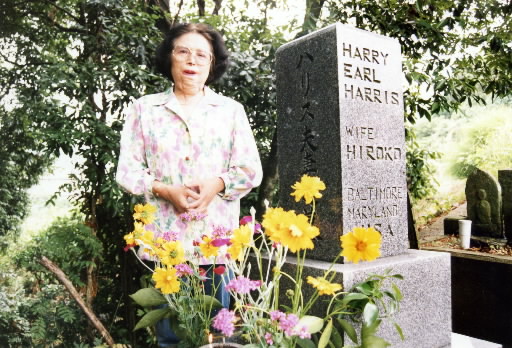Hiroshima Girls, Part 3: Half a Century After the Bombing [1]
Jul. 3, 2010
Late husband's love supported wife's spirit
by Masami Nishimoto, Staff Writer
This feature series on the "Hiroshima Girls," also known as "Hiroshima Maidens," is a close look at a number of Japanese women who were impacted by the atomic bombing of Hiroshima. The series was originally published in 1996.
"I had 13 operations here." Hiroko Tasaka, 64, managed to deliver a speech in English at a conference on medical care for A-bomb victims that was held in May at Mount Sinai Hospital in New York City. Although she feels uncomfortable about drawing attention, Ms. Tasaka felt it was her duty to go to the conference and express her gratitude for the project which provided treatment to her and other A-bomb survivors. Moreover, the experience offered her the opportunity to meet her husband.
Her house lies on Ikuchijima Island in Hiroshima Prefecture. The island is home to stretching mandarin orange groves and the Tatara Bridge, which will be the longest cable-stayed bridge in the world, is now being constructed to serve the island. A white bust welcomed me in the hall of her house, next to the house in which her 83-year-old mother, her younger sister, and her younger sister's husband live.
"One of my former teachers at a dressmaking school in Hiroshima which I attended made this for me," she said, explaining the bust. "It looks a lot like Toby." Toby was her nickname for Harry Harris, her late American husband. The bust is impressive for the tenderness and subtle strength which can be seen in the eyes, lips, and large nose. It has been seven years since he passed away.
She has returned to the island because "I felt lonely living in Baltimore, filled with so many memories." After her husband, ten years older than her, retired from a newspaper company in the U.S. city of Baltimore, he developed an aneurysm and died during an operation. Their married life had lasted 23 years.
As if to fill the great hole in her heart, Ms. Tasaka worked to complete her memoir, which she had begun writing in the United States. Her book caught the attention of a publishing company in Tokyo and was released last year, the 50th anniversary of the atomic bombing, with the title "Hiroko Ikite Ai" ("Hiroko Lives and Finds Love").
In the book, she tells about seeing the airplane that dropped the atomic bomb from her location in Naka Ward, where she had been mobilized for the war effort as a second-year student at Hiroshima Girls' School of Commerce; clinging to hope when undergoing medical treatment in the United States; receiving encouragement from her host family; encountering Harry Harris; and opening a dressmaking shop back in Japan after, at first, rebuffing his proposal of marriage. She relates her life, up to the time of writing, without exaggeration, and above all, her husband's overflowing love for her, to whom she married after exchanging letters for ten years.
During World War II, her husband's ship came under attack by warplanes off the coast of France. He managed to survive, alone, on the deck of the ship while his comrades perished. But he never spoke about that experience, right up until his death.
"I heard about that from my brother-in-law for the first time just before he died," said Ms. Tasaka. "He probably didn't want me to think that he chose me because of that awful experience." She suspected the silence of her husband, who detested war as much as she does, was out of consideration for her feelings.
Since her book was published, she has been receiving letters from people who obtained her address through the publishing company. A letter from the younger sister of one her classmates who was at the same worksite on the day of the bombing, but died in the blast, stabbed at her heart. Encouragement that came from junior high school students and others cheered her. Female students from Yokohama, along with other members of their group, told her that they would visit her in time for the anniversary of the atomic bombing this year.
Meanwhile, she feels distress over a question asked on the train on her way home from Hiroshima the other day: "Did you suffer some kind of accident?" There is no way to hide her scars and, due to the skin graft, she cannot open her mouth as she would like. But her feelings were not roused by the rude question; she is upset over the fact that the atomic bombing is being forgotten or has become unfamiliar to many.
"Before I didn't want to remember the bombing," Ms. Tasaka said. "Now, though, I think, 'I have to convey my story while I'm in good health.' Maybe it's because I'm getting older." Her voice was relaxed, in good spirits. This is why she wrote the book and accepted this interview.
In addition to a correspondence course on writing that she continues to follow, Ms. Tasaka has begun to study English again, saying that she still has some difficulty catching English expressions. "I want to live my life to the fullest," she said, clearly embodying her wish through her activities.
"My husband has left me love, the most important thing for human beings." Harry Harris, described in her book with such words, now rests at a temple in her town. Ms. Tasaka's posthumous Buddhist name is also inscribed on the grave they will share.
Many of the "Hiroshima Girls" have survived for more than half a century since their exposure to the atomic bomb. The Chugoku Shimbun seeks to share how they lived after the bombing, their thoughts about their lives, and their hopes for how their experiences will be perceived by the public.
(Originally published on July 26, 1996)
Hiroko Tasaka died in 1997 at the age of 65.








